2010年江苏高考英语听力原文-试题-答案
2010年全国卷高考英语听力原文-试题-答案

2010年普通高等学校招生全国统一考试(全国卷一)第一部分听力(共两节,满分30分)第一节(共5小题;每小题1。
5分,满分7。
5分)听下面5段对话。
每段对话后有一个小题,从题中所给的A、B、C三个选项中选出最佳选项,并标在试卷的相应位置。
听完每段对话后,你都有10秒种的时间来回答有关小题和阅读下一小题.每段对话仅读一遍。
1.What will Dorothy do on the weekend?A.Go out with her friend.B.Work on her paper.C.Make some plans。
2.What was the normal price of the Tshirt?A.$15。
B.$30. C.$50。
3.What has the woman decided to do on Sunday afternoon?A.To attend a wedding.B.To visit an exhibition。
C.To meet a friend.4.When does the bank close on Saturday?A.At 1:00 pm。
B.At 3:00 pm。
C.At 4:00 pm.5.Where are the speakers?A.In a store。
B.In a classroom.C.At a hotel。
第二节(共15小题;每小题1。
5分,满分22。
5分)听下面5段对话或独白。
每段对话或独白后有几道小题,从每题所给的A、B、C三个选项中选出最佳选项,并标在试卷的相应位置。
听每段对话或独白前,你将有时间阅读各个小题,每小题5秒钟;听完后,各小题将给出5秒钟的作答时间.每段对话或独白读两遍。
听第6段材料,回答第6至7题。
6.What do we know about Nora?A.She prefers a room of her own。
10年江苏英语高考卷试题答案
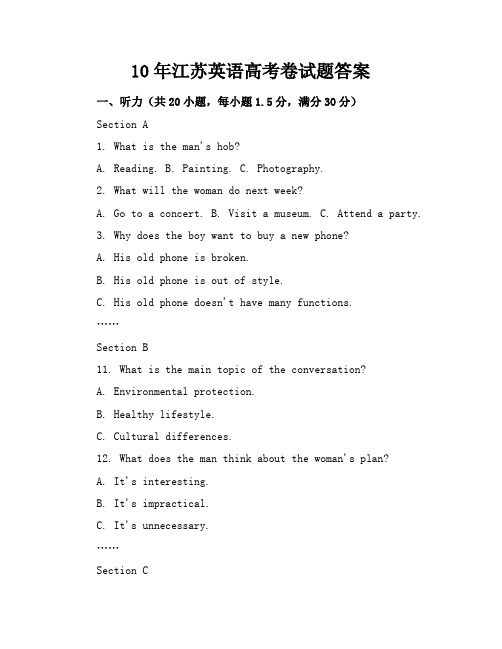
10年江苏英语高考卷试题答案一、听力(共20小题,每小题1.5分,满分30分)Section A1. What is the man's hob?A. Reading.B. Painting.C. Photography.2. What will the woman do next week?A. Go to a concert.B. Visit a museum.C. Attend a party.3. Why does the boy want to buy a new phone?A. His old phone is broken.B. His old phone is out of style.C. His old phone doesn't have many functions.……Section B11. What is the main topic of the conversation?A. Environmental protection.B. Healthy lifestyle.C. Cultural differences.12. What does the man think about the woman's plan?A. It's interesting.B. It's impractical.C. It's unnecessary.……Section C21. What is the speaker's attitude towards online learning?22. What are the advantages of public transportation mentioned in the passage?23. According to the speaker, what is the key to success in a job interview?……二、单项选择(共15小题,每小题1分,满分15分)31. — Excuse me, is this the right way to the library?— ________. It's over there.A. No problemC. Go aheadD. Yes, it is32. The old man ________ the street when the accident________.A. was crossing; happenedB. crossed; was happenedC. has crossed; has happenedD. had crossed; had happened……三、完形填空(共20小题,每小题1.5分,满分30分)Once upon a time, there was a young man named Li Hua who lived in a small village. He ________ his parents very muchand always wanted to make them proud. However, Li Hua was not good at studying, and he often ________ his exams.One day, Li Hua's father ________ him, "Son, you need to work hard if you want to succeed in life." Li Hua nodded and decided to ________ his father's advice. He started to spend more time on his studies and ________ his best to improve his grades.……四、阅读理解(共15小题,每小题2分,满分30分)AAccording to a survey, the sales of organic food have increased 20% in the past year. Many supermarkets and grocery stores now offer a variety of organic products, including fruits, vegetables, and dairy products.……BDear Editor,I am writing to express my concern about the increasing number of people who use their mobile phones while driving. This behavior not only puts the drivers themselves at risk but also endangers the lives of other road users.……五、任务型阅读(共10小题,每小题1分,满分10分)How to Stay Fit and Healthy1. Eat a balanced diet2. Exercise regularly3. Get enough sleep4. Maintain a positive attitude5. Reduce stress……六、书面表达(共25分)假设你是李华,你的英国朋友Peter来信询问你所在城市的变化。
2010年全国卷高考英语听力原文-试题-答案

2010年普通高等学校招生全国统一考试(全国卷一)第一部分听力(共两节,满分30分)第一节(共5小题;每小题1。
5分,满分7。
5分)听下面5段对话。
每段对话后有一个小题,从题中所给的A、B、C三个选项中选出最佳选项,并标在试卷的相应位置。
听完每段对话后,你都有10秒种的时间来回答有关小题和阅读下一小题.每段对话仅读一遍。
1.What will Dorothy do on the weekend?A.Go out with her friend。
B.Work on her paper.C.Make some plans。
2.What was the normal price of the Tshirt?A.$15. B.$30。
C.$50。
3.What has the woman decided to do on Sunday afternoon?A.To attend a wedding。
B.To visit an exhibition。
C.To meet a friend.4.When does the bank close on Saturday?A.At 1:00 pm。
B.At 3:00 pm。
C.At 4:00 pm.5.Where are the speakers?A.In a store。
B.In a classroom.C.At a hotel。
第二节(共15小题;每小题1.5分,满分22.5分)听下面5段对话或独白。
每段对话或独白后有几道小题,从每题所给的A、B、C三个选项中选出最佳选项,并标在试卷的相应位置.听每段对话或独白前,你将有时间阅读各个小题,每小题5秒钟;听完后,各小题将给出5秒钟的作答时间。
每段对话或独白读两遍。
听第6段材料,回答第6至7题。
6.What do we know about Nora?A.She prefers a room of her own。
2010年普通高等学校招生全国统一考试英语江苏卷,附答案
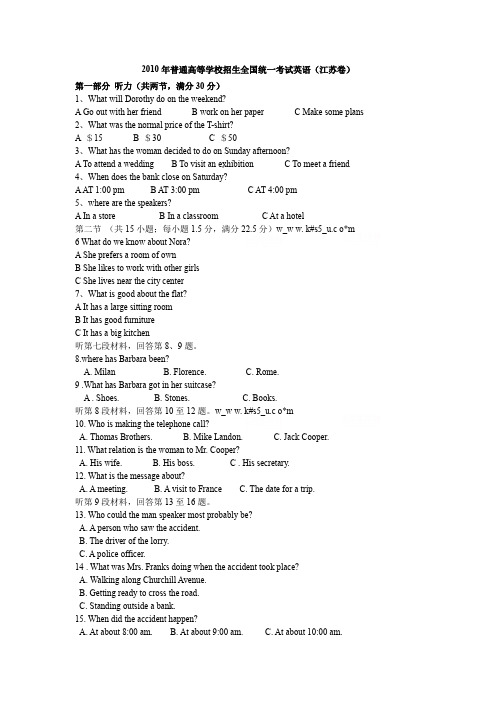
2010年普通高等学校招生全国统一考试英语(江苏卷)第一部分听力(共两节,满分30分)1、What will Dorothy do on the weekend?A Go out with her friendB work on her paperC Make some plans2、What was the normal price of the T-shirt?A $15B $30C $503、What has the woman decided to do on Sunday afternoon?A To attend a weddingB To visit an exhibitionC To meet a friend4、When does the bank close on Saturday?A AT 1:00 pmB AT 3:00 pmC AT 4:00 pm5、where are the speakers?A In a storeB In a classroomC At a hotel第二节(共15小题;每小题1.5分,满分22.5分)w_w w. k#s5_u.c o*m6 What do we know about Nora?A She prefers a room of ownB She likes to work with other girlsC She lives near the city center7、What is good about the flat?A It has a large sitting roomB It has good furnitureC It has a big kitchen听第七段材料,回答第8、9题。
8.where has Barbara been?A. MilanB. Florence.C. Rome.9 .What has Barbara got in her suitcase?A . Shoes. B. Stones. C. Books.听第8段材料,回答第10至12题。
2010年高考英语试卷听力+原文+答案(新课标Ⅰ、Ⅱ)[001]
![2010年高考英语试卷听力+原文+答案(新课标Ⅰ、Ⅱ)[001]](https://img.taocdn.com/s3/m/310f9f4376c66137ef06194d.png)
2010年全国统一高考英语试卷(新课标Ⅰ、Ⅱ)听力试题第一部分听力(共两节,满分30分)做题时,先将答案标在试卷上,录音结束后,你将有两分钟的时间将试卷上的答案转涂到答题卡上。
第一节(共5小题,每小题 1.5分,满分7.5分)听下面5段对话。
每段对话后有一个小题,从题中所给的A、B、C三个选项中选出最佳答案。
听完每段对话后,你都有10秒钟的时间来回答有关小题和阅读下一小题。
每段对话仅读一遍。
例: How much is the shirt?A. £ 19.15.B. £9.18.C. £9.15.答案是C.1. What will Dorothy do on the weekend?A. Go out with her friend.B. Work on her paper.C. Make some plans.2. What was the normal price of the T-shirt?A. $15.B. $30.C. $50.3. What has the woman decided to do on Sunday afternoon?A. To attend a wedding.B. To visit an exhibition.C. To meet a friend.4. When does the bank close on Saturday?A. At l:00 pm.B. At 3:00 pm.C. At 4:00 pm.5. Where are the speakers?A. In a store.B. In a classroom.C. At a hotel.第二节(共15小题,每小题 1.5分,满分22.5分)听下面5段对话或独白。
每段对话或独白后有几个小题,从题中所给的A、B、C三个选项中选出最佳选项,并标在试卷的相应位置。
听每段对话或独白前,你将有时间阅读各个小题,每小题5秒钟;听完后,个小题将给出5秒钟的作答时间。
2010年高考英语试卷及答案【江苏卷】

2010年普通高等学校招生全国统一考试(江苏卷)英语第一部分听力(共两节,满分30分)做题时,先将答案标在试卷上,录音内容结束后,你将有两分钟的时间将试卷上的答案转涂到答题卡上。
第一节(共5小题;每小题1分,满分5分)听下面5段对话,每段对话后有一个小题,从题中所给的A、B、C三个选项中选出最佳选项,并标在试卷的相应位置,听完每段对话后,你都有10秒钟的时间来回答有关小题的阅读下一小题,每段对话仅读一遍。
例:How much is the shirt?A £19.15B £9.15C £9.18答案是B1、What will Dorothy do on the weekend?A Go out with her friendB work on her paperC Make some plans2、What was the normal price of the T-shirt?A $15B $30C $503、What has the woman decided to do on Sunday afternoon?A To attend a weddingB To visit an exhibitionC To meet a friend4、When does the bank close on Saturday?A AT 1:00 pmB AT 3:00 pmC AT 4:00 pm5、where are the speakers?A In a storeB In a classroomC At a hotel第二节(共15小题;每小题1.5分,满分22.5分)听下面5段对话或独白,每段对话和独白后有几个小题,从题中所给的A B C三个选项中选出最佳选项,并标在试卷的相应位置,听每段对话和独白前,你将有时间阅读各个小题,每小题5分钟;听完后,各小题给出5秒钟的作答时间。
每段对话和独白读两遍。
江苏2010高考英语试卷(含答案)
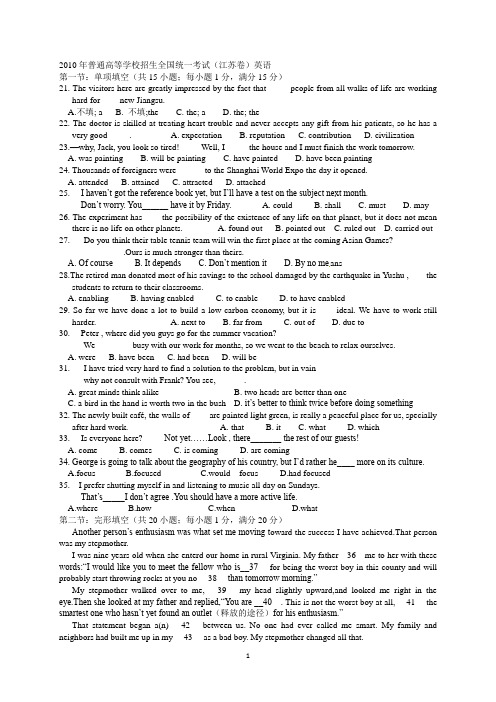
2010年普通高等学校招生全国统一考试(江苏卷)英语第一节:单项填空(共15小题;每小题1分,满分15分)21. The visitors here are greatly impressed by the fact that_____ people from all walks of life are workinghard for____ new Jiangsu.A.不填; aB. 不填;theC. the; aD. the; the22. The doctor is skilled at treating heart trouble and never accepts any gift from his patients, so he has avery good_____. A. expectation B. reputation C. contribution D. civilization23.—why, Jack, you look so tired! ---Well, I _____the house and I must finish the work tomorrow.A. was paintingB. will be paintingC. have paintedD. have been painting24. Thousands of foreigners were______ to the Shanghai World Expo the day it opened.A. attendedB. attainedC. attractedD. attached25. ---I haven‘t got the reference book yet, but I‘ll have a test on the subject next month.---Don‘t worry. Y ou______ have it by Friday. A. could B. shall C. must D. may 26. The experiment has____ the possibility of the existence of any life on that planet, but it does not meanthere is no life on other planets. A. found out B. pointed out C. ruled out D. carried out 27. ----Do you think their table tennis team will win the first place at the coming Asian Games?----_________.Ours is much stronger than theirs.A. Of courseB. It dependsC. Don‘t mention itD. By no me ans28.The retired man donated most of his savings to the school damaged by the earthquake in Y ushu ,____thestudents to return to their classrooms.A. enablingB. having enabledC. to enableD. to have enabled29. So far we have done a lot to build a low-carbon economy, but it is____ ideal. We have to work stillharder. A. next to B. far from C. out of D. due to30. ---Peter , where did you guys go for the summer vacation?----We________ busy with our work for months, so we went to the beach to relax ourselves.A. wereB. have beenC. had beenD. will be31. ----I have tried very hard to find a solution to the problem, but in vain----why not consult with Frank? Y ou see, ______.A. great minds think alikeB. two heads are better than oneC. a bird in the hand is worth two in the bushD. it‘s better to think twice before doing something32. The newly built café, the walls of____ are painted light green, is really a peaceful place for us, speciallyafter hard work. A. that B. it C. what D. which33. ---Is everyone here? ---Not yet……Look , there_______ the rest of our guests!A. comeB. comesC. is comingD. are coming34. George is going to talk about the geography of his country, but I‘d rather he____ more on its culture.A.focusB.focusedC.would focusD.had focused35.---I prefer shutting myself in and listening to music all day on Sundays.---That‘s_____I don‘t agree .Y ou should have a more active life.A.whereB.howC.whenD.what第二节:完形填空(共20小题;每小题1分,满分20分)Another person‘s enthusiasm was what set me moving t oward the success I have achieved.That person was my stepmother.I was nine years old when she enterd our home in rural Virginia. My father__36__me to her with these words:―I would like you to meet the fellow who is__37__ for being the worst boy in this county and will probably start throwing rocks at you no __38__ than tomorrow morning.‖My stepmother walked over to me, __39__ my head slightly upward,and looked me right in the eye.Then she looked at my father and replied,―Y ou are __40__. This is not the worst boy at all, __41__ the smartest one who hasn‘t yet found an outlet(释放的途径)for his enthusiasm.‖That statement began a(n) __42__ between us. No one had ever called me smart. My family and neighbors had built me up in my __43__ as a bad boy. My stepmother changed all that.She changed many things. She __44__ my father to go to a dental school, from which he graduated with honors. She moved our family into the county seat, where my father‘s career could be more __45__ and my brother and I could be better__46__ .When I turned fourteen,she bought me a secondhand__47__ and told me that she believed that I could become a writer. I knew her ernthusiasm, I__48__, and it had alreadly improved our lives. I accepted her __49__ and began to write for local newspapers. I was doing the same kind of__50__ that great day I went to interview Andrew Carnegie and received the task which became my life‘s work later.I wasn‘t the __51__ beneficiary (受益者). My father became the __52__ man in town. My brother and stepbrothers became a physician, a dentist, a lawyer, and a college president.What power __53__ has! When that power is released to support the certainty of one‘s purpose and is __54__ strengthened by faith, it becomes an irresistible(不可抗拒的)force which poverty and temporary defeat can never __55__.Y ou can communicate that power to anyone who needs it.This is probably the greatest work you can do with your enthusiasm.36.A.rushed B.sent C.carried D.introduced37.A.distinguished B.favored C.mistaken D.rewarded38. A.sooner ter C.longer D.earlier39. A.dragged B.shook C.raised D.bent40. A.perfect B.right C.wrong D.impolite41. A.but B.so C.and D.or42. A.ageement B.friendship C.gap D.relationship43. A.opinion B.image C.expectation D.mind44. A.begged B.persuaded C.ordered D.invited45. A.successful B.meaningful C.helpful eful46. A.treared B.entertained cated D.respected47. A.cemera B.radio C.bicycle D.typewriter48. A.considered B.suspected C.ignored D.appreciated49. A.belief B.request C.criticism D.description50. A.teaching B.writing C.studying D.reading51. A.next B.same C.only D.real52. A.cleverest B.wealthiest C.strongest D.healthiest53. A.ebthusiasm B.sympathy C.fortune D.confidence54. A.deliberately B.happily C.traditionally D.constantly55. A.win B.match C.reach D.doubt第三部分:阅读理解(共15小题;每小题2分,满分30分)AUsually, when your teacher asks a question, there is only one correct answer. But there is one question that has millions of current answers. That question is ―What‘s your name?‖ Everyone gives a different answer, but everyone is correct.Have you ever wondered about people‘s names? Where do they come from? What do they mean? People‘s first names, or given names, are chosen by their parents. Sometimes the name of a grandparent or other member of the family is used. Some parents choose the name of a well-known person. A boy could be named George Washington Smith; a girl could be named Helen Keller Jones.Some people give their children names that mean good things. Clara means ―bright‖; Beatrice means ―one who gives happiness‖; Donald means ―world ruler‖; Leonard means ―as brave as a lion‖.The earliest last names, or surnames, were taken from place names. A family with the name Brook or Brooks probably lived near brook(小溪);someone who was called Longstreet probably lived on a long, paved road. The Greenwood family lived in or near a leafy forest.Other early surnames came from people‘s occupations. The most common occupational name is Smith, which means a person who makes things with iron or other metals. In the past, smiths were very importantworkers in every town and village. Some other occupational names are: Carter — a person who owned or drove a cart; Potter —a person who made pots and pans.The ancestors of the Baker family probably baked bread for their neighbors in their native village. The Carpenter‘s great-great-great-grandfather probably built houses and furniture.Sometimes people were known for the color of their hair or skin, or their size, or their special abilities. When there were two men who were named John in the same village, the John with the gray hair probably became John Gray. Or the John was very tall could call himself John Tallman. John Fish was probably an excellent swimmer and John Lightfoot was probably a fast runner or a good dancer.Some family names were made by adding something to the father‘s name. English-speaking people added –s or –son. The Johnsons are descendants of John; the Roberts family‘s ancestor was Robert. Irish and Scottish people added Mac or Mc or O. Perhaps all of the MacDonnells and the McDonnells and the O‘Donnells are descendants of the same Donnell.56. Which of the following aspects do the surnames in the passage NOT cover?A. Places where people lived.B. People‘s characters.C. Talents that people possessed.D. People‘s occupations.57. According to the passage, the ancestors of the Potter family most probably _______.A. owned or drove a cartB. made things with metalsC. made kitchen tools or containsD. built houses and furniture58. Suppose an English couple whose ancestors lived near a leafy forest wanted their new-born son tobecome a world leader, the baby might be named _______.A. Beatrice SmithB. Leonard CarterC. George LongstreetD. Donald Greenwood59. The underlined word ―descendants‖ in the last paragraph means a person‘s _____A. later generationsB. friends and relativesC. colleagues and partnersD. later sponsorsBIt is reported that conservation groups in North America have been arguing about the benefits and dangers of wolves. Some groups believe wolves should be killed. Other people believe wolves must be protected so that they will not disappear from the wilderndss(荒野)For Killing WolvesIn Alaska,the wolf almost disappeared a few years ago,because hunters were killing hundreds of them for sport .However, 1aws were established to protect the wolves from sportsmen and people who catch the animals for their fur.So the wolf population has greatly increased. Now there are so many wolves that they are destroying their own food supply.A wolf naturally eats animals in the deer family. People in the wilderness also hunt deer for food.Many of the animals have been destroyed by the very cold winters recently and by changes in the wilderness plant life.When the deer can‘t find enough food,they die.If the wolves continue to kill large numbers of deer,their prey(猎物)will disappear someday.And the wolves will.too.So we must change the cycle of life in the wilderness to balance the ecology.If we killed more wolves,we would save them and their prey from dying out.We‘d alsosave some farm animals.In another northern state,wolves attack cows and chickens for food.Farmers want the government to send biologists to study the problem.They believe it necessary to kill wolves in some areas and to protect them in places where there is a small wolf population.Against Killing WolvesIf you had lived long ago,you would have heard many different stories about the dangerous wolf.According to most stories,hungry wolves often kill people for food.Even today,the stories of the―big bad wo lf'"will not disappear.But the fact is wolves are afraid of people, and they seldom travel in areas where there is a human smell. When wolves eat other animals, they usually kill the very young. or the sick and injured.The strongest survive .No kind of animal would have survived through the centuries if the weak members had lived, and that has always been a law of nature.Although some people say it is good sense to kill wolves, we say it is nonsense! Researchers have found wolves and their prey living in balance. The wolves keep the deer population from becoming too large,and that keeps a balance in the wilderness plant life.The real problem is that the areas where wolves can live are being used bv people. Even if wilderness land is not used directly for human needs, the wolves can‘t always find enou gh food. So they travel to the nearest source,which is often a farm. Then there is danger. The―big bad wolf‖has arrived! And everyone knows what happens next.60.According to the passage,some people in North America favor killing wolves for all the following reasons EXCET that .A.there are too many wolves B.they kill large numbers deerC.they attack cows and chickens for food D.they destroy the wilderness plant life 61.Some people are against killing wolves because .A.wolves help to keep the ecological balance in the wildemessB.there is too small a wolf population in the wildernessC.there are too many deer in the wildernessD.wolves are afraid of people and never attack people62.According to those against killing wolves,when wolves eat other animals,.A.they never eat strong and healthy onesB.they always go against the law of natureC.they might help this kind of animals survive in natureD.they disturb the ecological balance in the wilderness63.The last sentence―And everyone knows what happens next‖implies that in such cases.A.farm animals will be in danger and have to be shipped awayB.woIves will kill people and people will in turn kill themC.wolves wilI find enough food sources on famlsD.people will leave the areas where wolves can liveCNEXUS card is a Trusted Traveler Program that provides quick travel forildren 15 years of age and younger require only a birth certificate or64. If a Canadian who is on a 7-day trip to New Y ork buys $ 800 CAN worth of goods,how much should hepay tax on when returning home?A. $ 800 CANB. $750 CANC.$ 400 CAND. $ 50 CAN65. For an American citizen on a 2-day tour of Canada,how much tax does he have to pay on $ 1,600 USworth of purchases when returning to the US?A. $ 24 USB. $ 48 USC. $52 USD. $ 200 US66. What documentation should a couple with a 7-year-old child carry when they drive a car from Canadato America?A. A BC driver‘s license, an Air NEXUS card, and a birth certificate.B. An Air NEXUS card, a U.S. Coast Guard Merchant Marine Document, and a birth certificate.C. Two vaild passport crads and a certified copy of a birth certificate.D. A NEXUS card, a U.S. Coast Guard Merchant Marine Document.,and a certified copy of a birthcertificate.DImagine, one day, getting out of bed in Beijing and being at your office in Shanghai in only a couple of hours, and then, after a full day of work, going back home to Beijing and having dinner there.Sounds unusual, doesn't it? But it's not that unrealistic,with the development of China‘s high—speed railway system.And that‘s not a ll.China has an even greater high—speed railway plan—to connect the country with Southeast Asia,and eventually Eastern Europe.China is negotiating to extend its own high·-speed railway network to up to 17 countries in 10 to 15years,eventually reaching London and Singapore.China has proposed three such projects.The first would possibly connect Kunming with Singapore via Vietnam and Malaysia.Another could start in Urumqi and go through Kazakhstan and Uzbekistan,and possibly to Germany.The third would start in the northeast and go north through Russia and then into Western Europe.If China‘s plan for the high-speed railway goes forward,people could zip over from London to Beiling in under two days.The new system would still follow China‘s high—speed railway standard.And the trains would be able to go 346 kilometers an hour,almost as fast as some airplanes.China‘s bullet train(高速客车),the one connecting Wuhan to Guangzhou,already has the World‘s fastest average speed.It covers 1,069 kilometers in about three hours.Of course,there are some technical challenges to overcome.There are so many issues that need to be settled,such as safety,rail gauge(轨距),maintenance of railway tracks.So,it‘s important to pay attention to every detail.But the key issue is really money.China is already spending hundreds of billions of yuan on domestic railway expansion.China prefers that the other countries pay in natural resources rather than with capital investment. Resources from those countries could stream into China to sustain development.It‘ll be a win-win project. For other countries,the railway network will definitely create more opportunities for business,tourism and so on,not to mention the better communication among those countnes.For China,such a project would not only connect it with the rest of Asia and bring some much-needed resources,b ut would also help develop China‘s far west.We foresee that in the coming decades,millions of people will migrate to the western regions,where the land is empty and resources unused.With high-speed trains,people will set up factories and business centers in the west once and for all.And they‘ll trade with Central Asian and Eastern European countries.67.China‘s new high-speed railway plan will be a win-win project because .A.China will get much-needed resources and develop its western regionsB.China and the countries involved will benefit from the project in various waysC.China will develop its railway system and communication with other countriesD.the foreign countries involved will develop their railway transportation,business and tourism 68.According to the passage,the greatest challenge to the new high-speed railway plan is .A.technical issues B.safety of the system C.financial problems D.maintenance of railway tracks 69.Which of the following words best describes the author‘s attitude towards China‘s high-speed railway plan?A.Critical.B.Reserved.C.Doubtful D. Positive.70.Which of the following might be the best title for the passage?A.New Railway Standards B.Big Railway DreamsC.High—speed Bullet Trains D.International Railway Network第四部分:任务型阅读(共10小题;每小题1分,满分10分)For more than twenty years scientists have been seeking to understand the mystery of the‗‗sixth sense"of direction.By trying out ideas and solving problems one by one,they are now getting closer to one answer.One funny idea is that animals might have a built-in compass(指南针).Our earth itself is a big magnet(磁体).So a little magnetic needle that swings freely lines itself with the big earth magnet to point north and south.When people discovere d that idea about athousand years ago and invented the compass,it allowed sailors to navigate (航海)on oceanvoyages, even under cloudy skies. Actuallly the idea of the living compass came just from observing animals in nature.Many birds migrate twice a year between their summer homes and winter homes.Some of them fly for thousands of kilometers and mostly at night.Experiments have shown that some birds can recognize star patterns.But they can keep on course even under cloudy skies.How can they do that?A common bird that does not migrate but is great at finding its way home is the homing pigeon.Not all pigeons can find their way home.Those that can are very good at it,and they have been widely studied.One interesting experiment was to attach little magn ets to the birds‘ heads to block their magnetic sense—just as a loud radio can keep you from hearing a call to dinner.On sunny days, that did not fool the pigeons.Evidently they can use the sun to tell which way they are going.But on cloudy days,the pigeons with magnets could not find their way.It was as if the magnets had blocked their magnetic sense.Similar experiments with the same kind of results were done with honeybees.These insects also seem to have a special sense ot direction.In spite of the experiments,the idea of an animal compass seemed pretty extraordinary.How would an animal get the magnetic stuff for a compass.An answer came from an unexpected source.A scientist was studying bacteria that live in the mud of ponds and marshes.He found accidentally little rod-like bacteria that all swam together in one direction—north.Further study showed that each little bacterium had a chain of dense particles inside,which proved magnetic.The bacteria had made themselves into little magnets that could line up with the earth‘s magnet.The big news was that a living thing,even a simple bacterium,can make magnetite.That led to a search to see whether animals might have it.. By using a special instrument called magnetometer,scientists were able to find magnetite in bees and birds,and even in fish.In each animal,except for the bee.the magnetic stuff was always in or closer to the brain.Thus.the idea of a built—in animal compass began to seem reasonable.第五部分:书面表达(满分25分)81.假设你应邀参加学校组织的―英语学习师生座谈会‖,请你根据下表所提示的信息,用英语写一篇发言稿,简单介绍自己英语学习的情况,并对学校今后的英语教学提出建议。
2010年江苏高考英语试卷与解析

2010年普通高等学校招生全国统一考试(江苏卷)英语第一部分听力(共两节,满分30分)做题时,先将答案标在试卷上,录音内容结束后,你将有两分钟的时间将试卷上的答案转涂到答题卡上。
第一节(共5小题;每小题1分,满分5分)听下面5段对话,每段对话后有一个小题,从题中所给的A、B、C三个选项中选出最佳选项,并标在试卷的相应位置,听完每段对话后,你都有10秒钟的时间来回答有关小题的阅读下一小题,每段对话仅读一遍。
例:How much is the shirt?A £19.15B £9.15C £9.18答案是B1、What will Dorothy do on the weekend?A Go out with her friendB work on her paperC Make some plans2、What was the normal price of the T-shirt?A $15B $30C $503、What has the woman decided to do on Sunday afternoon?A To attend a weddingB To visit an exhibitionC To meet a friend4、When does the bank close on Saturday?A AT 1:00 pmB AT 3:00 pmC AT 4:00 pm5、where are the speakers?A In a storeB In a classroomC At a hotel第二节(共15小题;每小题1.5分,满分22.5分)听下面5段对话或独白,每段对话和独白后有几个小题,从题中所给的A B C三个选项中选出最佳选项,并标在试卷的相应位置,听每段对话和独白前,你将有时间阅读各个小题,每小题5分钟;听完后,各小题给出5秒钟的作答时间。
每段对话和独白读两遍。
2010年江苏卷高考英语试题真题(word版)
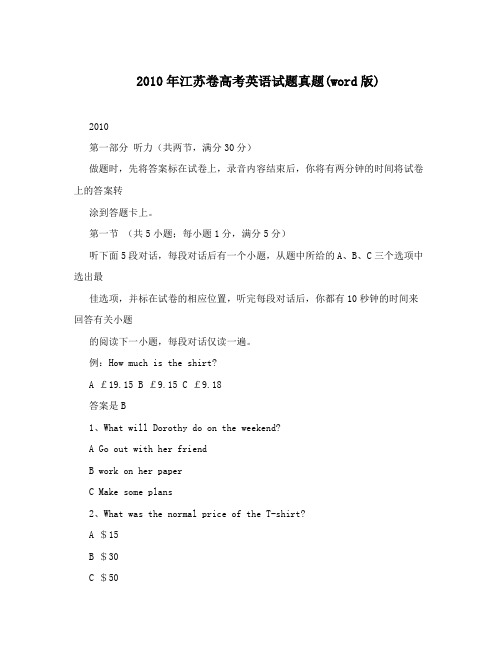
2010年江苏卷高考英语试题真题(word版)2010第一部分听力(共两节,满分30分)做题时,先将答案标在试卷上,录音内容结束后,你将有两分钟的时间将试卷上的答案转涂到答题卡上。
第一节(共5小题;每小题1分,满分5分)听下面5段对话,每段对话后有一个小题,从题中所给的A、B、C三个选项中选出最佳选项,并标在试卷的相应位置,听完每段对话后,你都有10秒钟的时间来回答有关小题的阅读下一小题,每段对话仅读一遍。
例:How much is the shirt?A £19.15B £9.15C £9.18答案是B1、What will Dorothy do on the weekend?A Go out with her friendB work on her paperC Make some plans2、What was the normal price of the T-shirt?A $15B $30C $503、What has the woman decided to do on Sunday afternoon?A To attend a weddingB To visit an exhibitionC To meet a friend4、When does the bank close on Saturday?A AT 1:00 pmB AT 3:00 pmC AT 4:00 pm5、where are the speakers?A In a storeB In a classroomC At a hotel第二节(共15小题;每小题1.5分,满分22.5分)听下面5段对话或独白,每段对话和独白后有几个小题,从题中所给的A B C 三个选项中选出最佳选项,并标在试卷的相应位置,听每段对话和独白前,你将有时间阅读各个小题,每小题5分钟;听完后,各小题给出5秒钟的作答时间。
每段对话和独白读两遍。
2010年江苏省高考英语试卷及答案
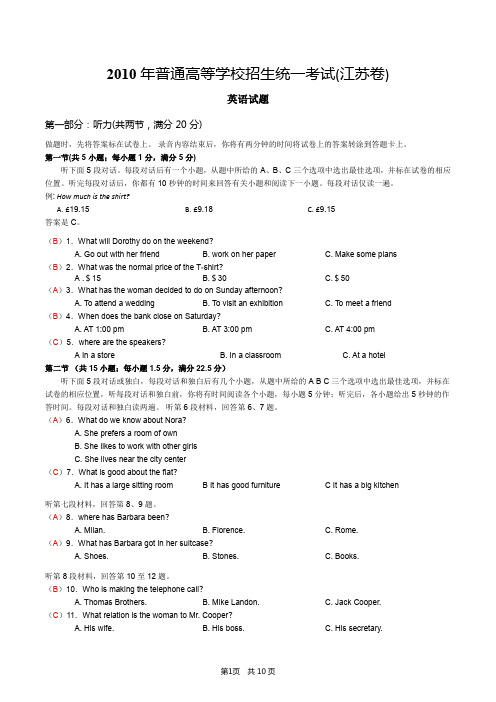
2010年普通高等学校招生统一考试(江苏卷)英语试题第一部分:听力(共两节,满分 20 分)做题时,先将答案标在试卷上。
录音内容结束后,你将有两分钟的时间将试卷上的答案转涂到答题卡上。
第一节(共 5 小题;每小题 1 分,满分 5 分)听下面 5 段对话。
每段对话后有一个小题,从题中所给的 A、B、C 三个选项中选出最佳选项,并标在试卷的相应位置。
听完每段对话后,你都有10秒钟的时间来回答有关小题和阅读下一小题。
每段对话仅读一遍。
例: How much is the shirt?A.₤19.15B.₤9.18C.₤9.15答案是 C。
(B)1.What will Dorothy do on the weekend?A. Go out with her friendB. work on her paperC. Make some plans(B)2.What was the normal price of the T-shirt?A .$15 B.$30 C.$50(A)3.What has the woman decided to do on Sunday afternoon?A. To attend a weddingB. To visit an exhibitionC. To meet a friend(B)4.When does the bank close on Saturday?A. AT 1:00 pmB. AT 3:00 pmC. AT 4:00 pm(C)5.where are the speakers?A In a store B. In a classroom C. At a hotel第二节(共15小题;每小题1.5分,满分22.5分)听下面5段对话或独白,每段对话和独白后有几个小题,从题中所给的A B C三个选项中选出最佳选项,并标在试卷的相应位置,听每段对话和独白前,你将有时间阅读各个小题,每小题5分钟;听完后,各小题给出5秒钟的作答时间。
2010年江苏高考英语听力原文-试题-答案
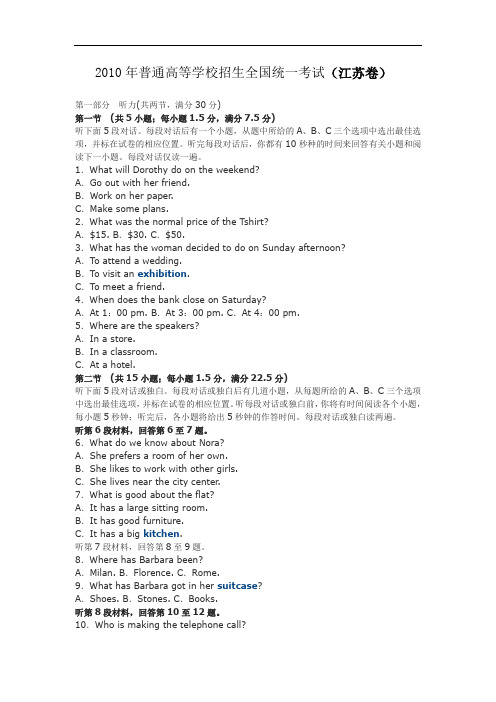
2010年普通高等学校招生全国统一考试(江苏卷)第一部分听力(共两节,满分30分)第一节(共5小题;每小题1.5分,满分7.5分)听下面5段对话。
每段对话后有一个小题,从题中所给的A、B、C三个选项中选出最佳选项,并标在试卷的相应位置。
听完每段对话后,你都有10秒种的时间来回答有关小题和阅读下一小题。
每段对话仅读一遍。
1.What will Dorothy do on the weekend?A.Go out with her friend.B.Work on her paper.C.Make some plans.2.What was the normal price of the Tshirt?A.$15. B.$30. C.$50.3.What has the woman decided to do on Sunday afternoon?A.To attend a wedding.B.To visit an exhibition.C.To meet a friend.4.When does the bank close on Saturday?A.At 1:00 pm. B.At 3:00 pm. C.At 4:00 pm.5.Where are the speakers?A.In a store.B.In a classroom.C.At a hotel.第二节(共15小题;每小题1.5分,满分22.5分)听下面5段对话或独白。
每段对话或独白后有几道小题,从每题所给的A、B、C三个选项中选出最佳选项,并标在试卷的相应位置。
听每段对话或独白前,你将有时间阅读各个小题,每小题5秒钟;听完后,各小题将给出5秒钟的作答时间。
每段对话或独白读两遍。
听第6段材料,回答第6至7题。
6.What do we know about Nora?A.She prefers a room of her own.B.She likes to work with other girls.C.She lives near the city center.7.What is good about the flat?A.It has a large sitting room.B.It has good furniture.C.It has a big kitchen.听第7段材料,回答第8至9题。
2010年高考英语试卷听力+原文+答案(新课标Ⅰ、Ⅱ)

2010年全国统一高考英语试卷(新课标Ⅰ、Ⅱ)听力试题第一部分听力(共两节,满分30分)做题时,先将答案标在试卷上,录音结束后,你将有两分钟的时间将试卷上的答案转涂到答题卡上。
第一节(共5小题,每小题1.5分,满分7.5分)听下面5段对话。
每段对话后有一个小题,从题中所给的A、B、C三个选项中选出最佳答案。
听完每段对话后,你都有10秒钟的时间来回答有关小题和阅读下一小题。
每段对话仅读一遍。
例: How much is the shirt?A. £ 19.15.B. £9.18.C. £9.15.答案是C.1. What will Dorothy do on the weekend?A. Go out with her friend.B. Work on her paper.C. Make some plans.2. What was the normal price of the T-shirt?A. $15.B. $30.C. $50.3. What has the woman decided to do on Sunday afternoon?A. To attend a wedding.B. To visit an exhibition.C. To meet a friend.4. When does the bank close on Saturday?A. At l:00 pm.B. At 3:00 pm.C. At 4:00 pm.5. Where are the speakers?A. In a store.B. In a classroom.C. At a hotel.第二节(共15小题,每小题1.5分,满分22.5分)听下面5段对话或独白。
每段对话或独白后有几个小题,从题中所给的A、B、C三个选项中选出最佳选项,并标在试卷的相应位置。
听每段对话或独白前,你将有时间阅读各个小题,每小题5秒钟;听完后,个小题将给出5秒钟的作答时间。
江苏 高考英语试题听力材料及答案讲课讲稿
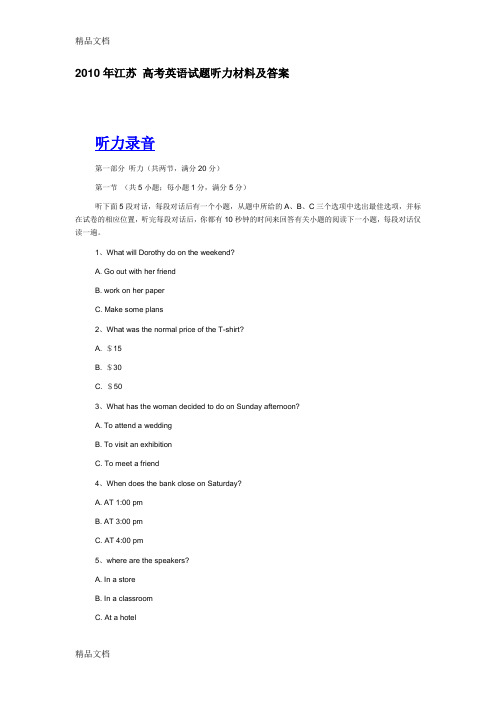
2010年江苏高考英语试题听力材料及答案听力录音第一部分听力(共两节,满分20分)第一节(共5小题;每小题1分,满分5分)听下面5段对话,每段对话后有一个小题,从题中所给的A、B、C三个选项中选出最佳选项,并标在试卷的相应位置,听完每段对话后,你都有10秒钟的时间来回答有关小题的阅读下一小题,每段对话仅读一遍。
1、What will Dorothy do on the weekend?A. Go out with her friendB. work on her paperC. Make some plans2、What was the normal price of the T-shirt?A. $15B. $30C. $503、What has the woman decided to do on Sunday afternoon?A. To attend a weddingB. To visit an exhibitionC. To meet a friend4、When does the bank close on Saturday?A. AT 1:00 pmB. AT 3:00 pmC. AT 4:00 pm5、where are the speakers?A. In a storeB. In a classroomC. At a hotel第二节(共15小题;每小题1分,满分15分)听第6段材料,回答第6、7题。
6 What do we know about Nora?A She prefers a room of ownB She likes to work with other girlsC She lives near the city center7、What is good about the flat?A It has a large sitting roomB It has good furnitureC It has a big kitchen听第七段材料,回答第8、9题。
2010年高考英语(江苏卷)真题及答案
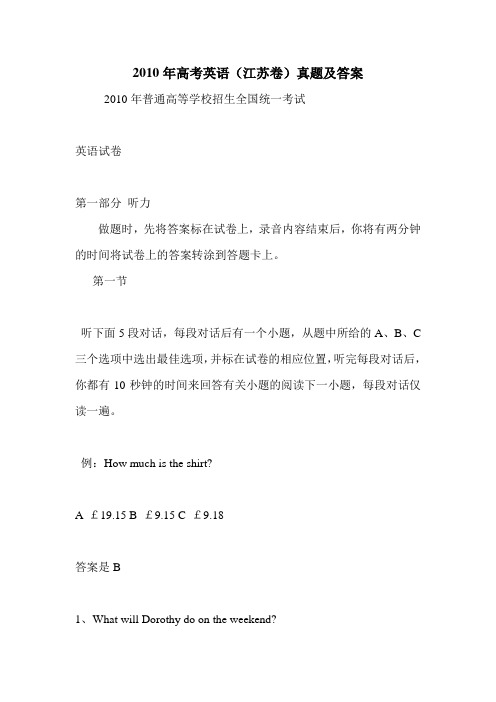
2010年高考英语(江苏卷)真题及答案2010年普通高等学校招生全国统一考试英语试卷第一部分听力做题时,先将答案标在试卷上,录音内容结束后,你将有两分钟的时间将试卷上的答案转涂到答题卡上。
第一节听下面5段对话,每段对话后有一个小题,从题中所给的A、B、C 三个选项中选出最佳选项,并标在试卷的相应位置,听完每段对话后,你都有10秒钟的时间来回答有关小题的阅读下一小题,每段对话仅读一遍。
例:How much is the shirt?A £19.15B £9.15C £9.18答案是B1、What will Dorothy do on the weekend?A Go out with her friendB work on her paperC Make some plans2、What was the normal price of the T-shirt?A $15B $30C $503、What has the woman decided to do on Sunday afternoon?A To attend a weddingB To visit an exhibitionC To meet a friend4、When does the bank close on Saturday?A AT 1:00 pmB AT 3:00 pmC AT 4:00 pm5、where are the speakers?A In a storeB In a classroomC At a hotel第二节听下面5段对话或独白,每段对话和独白后有几个小题,从题中所给的A B C三个选项中选出最佳选项,并标在试卷的相应位置,听每段对话和独白前,你将有时间阅读各个小题,每小题5分钟;听完后,各小题给出5秒钟的作答时间。
每段对话和独白读两遍。
听第6段材料,回答第6、7题。
6 What do we know about Nora?A She prefers a room of ownB She likes to work with other girlsC She lives near the city center7、What is good about the flat?A It has a large sitting roomB It has good furnitureC It has a big kitchen听第七段材料,回答第8、9题。
- 1、下载文档前请自行甄别文档内容的完整性,平台不提供额外的编辑、内容补充、找答案等附加服务。
- 2、"仅部分预览"的文档,不可在线预览部分如存在完整性等问题,可反馈申请退款(可完整预览的文档不适用该条件!)。
- 3、如文档侵犯您的权益,请联系客服反馈,我们会尽快为您处理(人工客服工作时间:9:00-18:30)。
2010年普通高等学校招生全国统一考试(江苏卷)第一部分听力(共两节,满分30分)第一节(共5小题;每小题1.5分,满分7.5分)听下面5段对话。
每段对话后有一个小题,从题中所给的A、B、C三个选项中选出最佳选项,并标在试卷的相应位置。
听完每段对话后,你都有10秒种的时间来回答有关小题和阅读下一小题。
每段对话仅读一遍。
1.What will Dorothy do on the weekend?A.Go out with her friend.B.Work on her paper.C.Make some plans.2.What was the normal price of the Tshirt?A.$15. B.$30. C.$50.3.What has the woman decided to do on Sunday afternoon?A.To attend a wedding.B.To visit an exhibition.C.To meet a friend.4.When does the bank close on Saturday?A.At 1:00 pm. B.At 3:00 pm. C.At 4:00 pm.5.Where are the speakers?A.In a store.B.In a classroom.C.At a hotel.第二节(共15小题;每小题1.5分,满分22.5分)听下面5段对话或独白。
每段对话或独白后有几道小题,从每题所给的A、B、C三个选项中选出最佳选项,并标在试卷的相应位置。
听每段对话或独白前,你将有时间阅读各个小题,每小题5秒钟;听完后,各小题将给出5秒钟的作答时间。
每段对话或独白读两遍。
听第6段材料,回答第6至7题。
6.What do we know about Nora?A.She prefers a room of her own.B.She likes to work with other girls.C.She lives near the city center.7.What is good about the flat?A.It has a large sitting room.B.It has good furniture.C.It has a big kitchen.听第7段材料,回答第8至9题。
8.Where has Barbara been?A.Milan. B.Florence. C.Rome.9.What has Barbara got in her suitcase?A.Shoes. B.Stones. C.Books.听第8段材料,回答第10至12题。
10.Who is making the telephone call?A.Thomas Brothers.B.Mike Landon.C.Jack Cooper.11.What relation is the woman to Mr.Cooper?A.His wife. B.His boss. C.His secretary.12.What is the message about?A.A meeting.B.A visit to France.C.The date for a trip.听第9段材料,回答第13至16题。
13.Who could the man speaker most probably be?A.A person who saw the accident.B.The driver of the lorry.C.A police officer.14.What was Mrs.Franks doing when the accident took place? A.Walking along Churchill Avenue.B.Getting ready to cross the road.C.Standing outside a bank.15.When did the accident happen?A.At about 8:00 am.B.At about 9:00 am.C.At about 10:00 am.16.How did the accident happen?A.A lorry hit a car.B.A car ran into a lorry.C.A bank clerk rushed into the street.听第10段材料,回答第17至20题。
17.What is the talk mainly about?A.The history of the school.B.The courses for the term.C.The plan for the day.18.Where can the visitors learn about the subjects for new students? A.In the school hall.B.In the science labs.C.In the classrooms.19.What can students do in the practical areas?A.Take science courses.B.Enjoy excellent meals.C.Attend workshops.20.When are the visitors expected to ask questions?A.During the lunch hour.B.After the welcome speech.C.Before the tour of the labs.答案:1.B 2.B 3.A 4.B 5.C 6.A7.C8.A9.A10.B11.C12.A13.C 14.C15.B16.B17.C18.B19.C20.A听力录音材料Text 1M:Do you have any plans for the weekend,Dorothy? Would like to join me for an outing?W:Thanks. But I am going to work on my paper allweekend.Text 2W:So what did you buy?M:A Tshirt. It was a real bargain. I got it half price, saving 15 dollars.Text 3M:I am going to the museum Sunday afternoon. There is a new exhibition of In dian art. Wantto come with me?W:I'd love to. But my best friend is getting married on Sunday and I won't miss i t foranything.Text 4W:National Bank, can I help you?M:Yes, please. What are your business hours?W:We open at 9 and close at 4 during the week. On Saturday we close one hour earlier at 3and we're closed on Sunday.Text 5W:May I help you, sir?M:Yes, I seem to have lost my room key.W:In that case, you'll need to go to the front desk to get another one.Text 6M:Hello, Nora. I heard about a flat that may interest you girls. It's near the cent ral bus stationon the main road and about 75 pounds a week. Quite reasona ble, the problem is it's only gottwo bedrooms. But I expect two of you could s hare.W:Well, as long as it isn't me. I've got to have my own room because I'll be wor king at homemost of the time. Any other information?M:Yes. It's got a very big and well-equipped kitchen and I know you like cooking. So that'sanother point in its favor. But there is a small sitting room and not much furniture yet. So letme k now quickly if you want it, or it'll be taken.Text 7M:Hello, Barbara, welcome back. You look great.W:Rod, it's lovely to see you again.M:How was your trip?W:Fine but tiring. Milan was interesting. It's bigger than I expected, noisier and dirtier too.M:And Florence? What did you think of Florence?W:Well, I didn't go there. Have you been there?M:No, I've never been to Italy. I'd really like to go to Rome. Well, the car's in th e car park. Isthis all your luggage?W:Yes, but the suitcase is very heavy.M:Barbara, what's in it, books or stones?W:Just 20 pairs of shoes.Text 8W:Hello, Thomas Brothers.M:Hello, this is Mike Landon here. Is Jack Copper there by any chance?W:I am afraid not. He is away for a day or two. Back on...let's see...Monday mor ning.M:Oh, well, perhaps I can leave a message for him.W:Yes, of course, just a minute. Now let's see, to Jack Copper from Mike London. M:No, Landon, LANDON.W:Sorry, yes, got that. And what's the message?M:Well, it's just this: could he come to a meeting on Monday afternoon at 5 pm? W:That's this coming Monday, October 12?M:Right. It's to discuss the new factory in France.W:Fine. I've got that. I'll see that he gets it as soon as he comes in on Monday. M:Good. Thank you. Goodbye.Text 9M:Now Mrs. Franks, I'd just like to read your statement back to you, and then you can writeyour name on it.W:Fine.M:I was standing in front of the second National Bank building at about 8:50 am. I saw asmall red car heading for the crossroads of Churchill Avenue i n York road. It was comingtowards me along Churchill Avenue at about 40 mil es per hour. The traffic lights on York Roadchanged to green and a delivery lorry began to move forward at about 5 miles per hour. Thedriver of the car pro bably didn't see that his traffic lights had changed from orange to red andran into the side of the lorry.W:That's correct.Text 10Welcome to Montfort school. Thank you for choosing our school and for joinin g the happyMontfort family which has been educating boys since 1916. We ar e so happy that you havetaken time off to be with us today. It is with great pl easure that we have prepared some eventsthat we hope we'll please you. At 9 am our headmaster will give a welcome speech. This will bein the school hall. Please be seated by 8:45 am. Following the speech is the guided tour of the exhibition at 9:30. Here you can see the proud history of our school and our achievements in the field of education. The exhibition is laid out in the classrooms on the sec ond floor, then theguided tour of science labs at 10:20 am. Here you can see the subjects that new students willbe studying. You will also notice that our labs have excellent equipment. At 11 am you will beg uided to the tour to practical areas. This covers our technical workshops, mu sic and otherareas of our school life. At Montfort, we believe in all-round development of our students. Lunchwill be at 12. It has been specially prepared for our guests. All our teachers and student leaderswill be present t o answer any questions that you have in your minds. We are so happy that yo ucould be with us today.。
